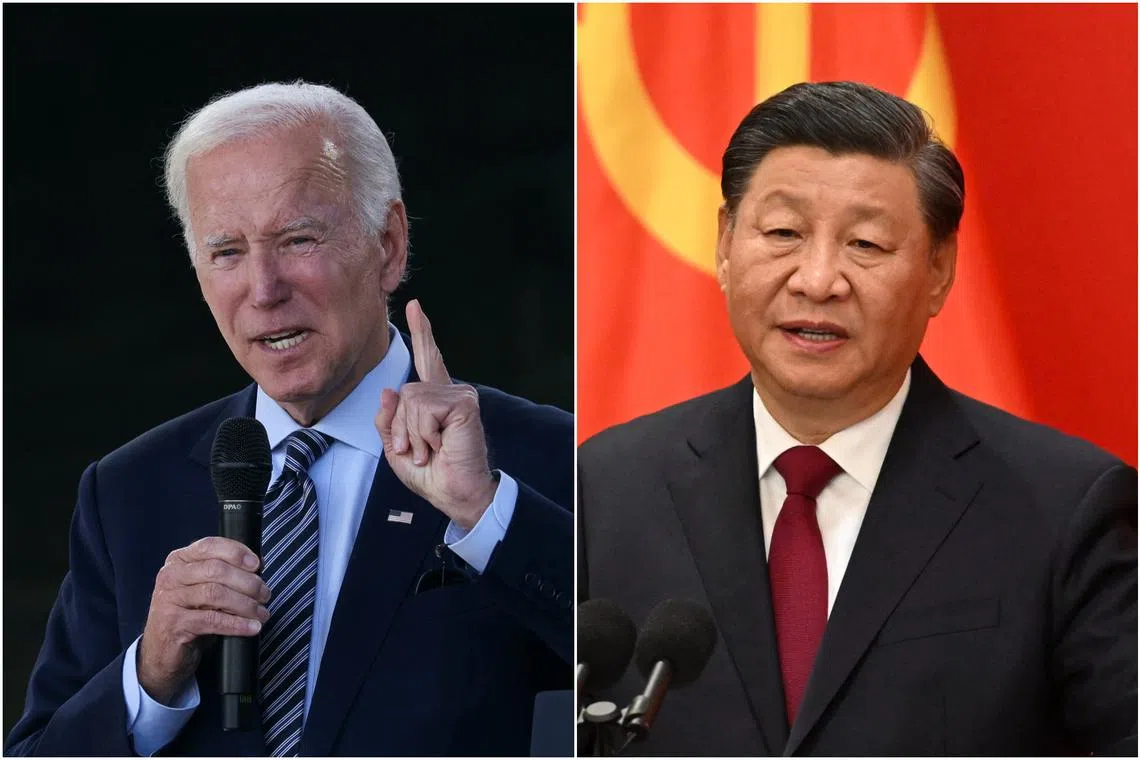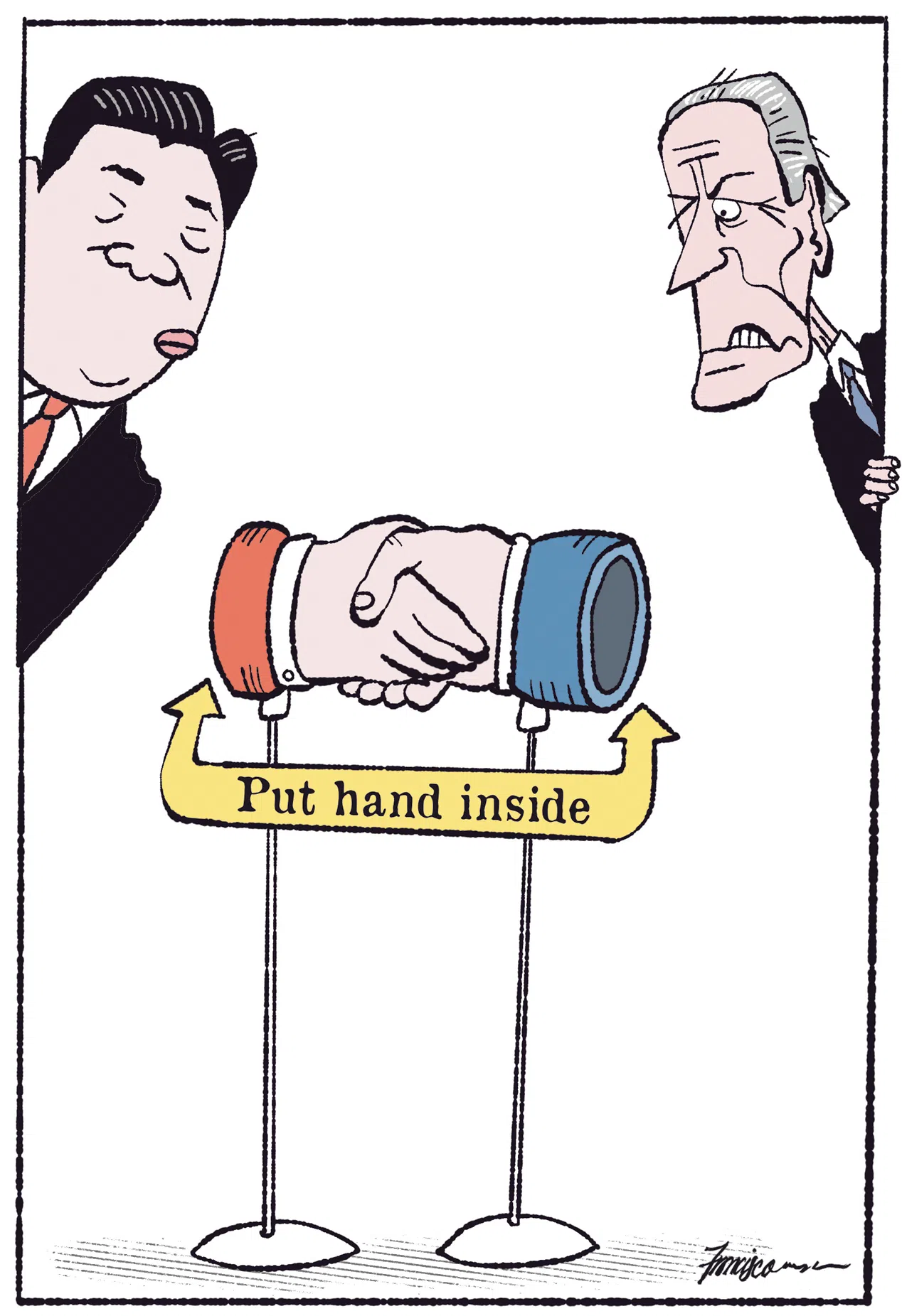Speaking Of Asia
High stakes for US-China meeting between Xi, Biden
But a G-20 handshake in Bali could shape the future of Asia
Sign up now: Get ST's newsletters delivered to your inbox

A meeting in Bali between Mr Joe Biden and his Chinese counterpart Xi Jinping could have extraordinary significance for Asia.
PHOTOS: AFP, REUTERS
Ambassador-at-Large Chan Heng Chee says she’d never before seen the United States-China relationship in such a bad place. Worse, there seemed to be no floor to a potential descent.
At the Asia Future Summit
It is a sobering thought for South-east Asia, which has close ties with both the US, its top investor, and China, its biggest trading partner and largest neighbour. But if relations between the world’s two superpowers are this bad, calm heads on both sides should desire a modus vivendi.
For this reason, a meeting next week in Bali between US President Joe Biden and his Chinese counterpart Xi Jinping could have extraordinary significance for Asia, the theatre for the world’s most critical developing geopolitical contest.
Open for dialogue?
But is it on? Neither has confirmed that a summit, or even a pull-aside, will materialise on the sidelines of the Group of 20 (G-20) meeting in Bali. The Chinese say their experience with former US president Donald Trump, who often sought to get political mileage from announcements made too early, dissuades them from saying anything prematurely.
Both sides will most likely be asked about the matter and feel compelled to say something later this week at the Asean-convened East Asia Summit hosted by Cambodia.
Behind the scenes, preparations may have been under way. A meeting between Chinese Foreign Minister and State Councillor Wang Yi with US Ambassador to Beijing Nicholas Burns and a subsequent phone call between Mr Wang, who was recently elevated to the Politburo, and his American counterpart Antony Blinken
China does seem keen on getting back into the swing of diplomacy. There is talk that at the G-20, Mr Xi may have a separate meeting
The presence of a three-star admiral of the People’s Liberation Army Navy at a Japan-hosted naval symposium this week was also probably aimed at signalling to the world, and key neighbours in particular, that China has not closed itself off to dialogue.
Such a sentiment will surely be reciprocated. Manila, where nationalism these days is framed in anti-China rhetoric, has already made a significant gesture towards Beijing by nominating the well-connected former journalist and China expert Jaime FlorCruz as its envoy. In an earlier era, when Ferdinand Marcos senior was president, Mr FlorCruz, who was opposed to the regime, had self-exiled in China.
Still, any optimism must be tempered. Neither Mr Biden nor Mr Xi is in the best of places domestically. This will weigh on the way both prepare to meet, if they do, and what happens afterwards.
A divided Western camp
Mr Biden arrives in Bali with the weaker hand. It was only in October that the National Security Strategy released by the White House celebrated the unity in the US-led Western camp achieved in the wake of Russia’s invasion of Ukraine.
But last week, German Chancellor Olaf Scholz drove a Volkswagen truck through that edifice of solidarity with a controversial trip to Beijing
They include a postponed summit between the leaders of Germany and France, the continent’s biggest and second-largest economies, and Mr Scholz’s apparent refusal to consider travelling to Beijing together with French President Emmanuel Macron to signal European oneness in outlook and purpose.

ST ILLUSTRATION: MANNY FRANCISCO
The ruling German coalition is a house divided. Mr Scholz is consistently being outshone by his charismatic Foreign Minister Annalena Baerbock, who is widely regarded as a China hawk and is consulting with other ministries on a new national strategy towards China.
The ruling German coalition had also been rocked by Mr Scholz’s decision to allow China’s Cosco to take a stake in the port of Hamburg, the nation’s second-biggest city where he had previously been mayor.
Germany had believed that building a relationship of mutual economic benefit with Russia by primarily opening its markets to Russian energy supplies was the surest pathway to a lasting European peace. This orientation was hugely unsettling for those whose suspicions of Moscow persisted.
But Russia’s invasion of Ukraine has been a wake-up call, leading Mr Scholz to announce a huge increase in defence outlay in February.
Just as clearly, national interests will guide Mr Scholz to keep the economic relationship with China stable and stand against economic decoupling. When you boil it down, it is not easy to see China as a threat to Western democracies. And Germany, the de facto leader of Western Europe, has other priorities.
This does not help Mr Biden, already embarrassed by the refusal of close ally Saudi Arabia, and near-ally India, to toe his line on Russia.
Perhaps he can count on Britain, and to a degree, France, for support. But Germany is unlikely to risk its US$242 billion (S$338 billion) trade relationship with China to go along with US strategy, especially when Washington is promoting home-shoring and Buy American policies in sectors critical to Germany, including electric cars and high-end electronics which employ millions of German workers.
China in a hard place
Neither for that matter is Mr Xi in a happy place. For all the talk about him establishing unquestioned dominance and consolidating power by taking on a third term, the recent 20th Congress of the Communist Party of China
The speculation that former president Hu Jintao was evicted from the hall just before some sort of planned expression of discomfort over an emerging leadership cult has refused to die down.
Likewise, the ouster from the State Council of fast-rising Vice-Premier Hu Chunhua suggests struggle with elements related to the Communist Youth League, which he was once a part of.
It is difficult to gauge the quality of advice Mr Xi receives and how much information gets to him. This conundrum is coming into sharper focus with the appointment of former minister of state security Chen Wenqing to the inner circle of the 24-member Politburo.
If Mr Vladimir Putin’s misadventure in Ukraine is any indication, even the most capable and trusted spymasters may be tempted to tailor information to fit what their principal client wants to hear, for fear of losing favour with the boss.
Unlike the Bidens and Narendra Modis of the world who draw their legitimacy directly from the people, Mr Xi gets his mandate from the Communist Party. This is why having representatives of different factions in the inner circle of decision-making in the Politburo Standing Committee matters.
Weak feedback mechanisms and the absence of balancing forces raise the spectre of what famed US strategist Edward Luttwak described at the Asia Future Summit as “Great State Autism”
A besieged Biden, an aloof Xi
As he travels to Bali, Mr Xi may figure that he is not only doing business with a lame duck counterpart substantially weakened by the US midterms but, more importantly, a democracy in decline. That conclusion could weaken any urgent desire on China’s part to be specially emollient towards Washington.
The US also may be bogged down with its own internal distractions in the years ahead. The New York Times recently calculated that eight Republican Senators and 139 Republican House Representatives who ran this week had sought to overturn the results of the 2020 presidential election on spurious allegations of election fraud.
The results are streaming in as these lines are written, but many of these lawmakers have a good chance of victory. A Congress held by more of the strident Republicans who believe Mr Biden is an illegitimate president will go on the offensive on Hunter Biden investigations and impeachment and will suck up most of Mr Biden’s bandwidth.
A besieged Biden and an isolated Xi are not the ideal ingredients for peace. However, to pass up this chance would be a mistake.
As the next US presidential contest rolls around, a weakened incumbent and a revitalised challenger – especially if that happens to be Mr Trump – will only sharpen US rhetoric towards China.
Taiwan too will have its own presidential polls in 2024. Can Beijing live with pro-Taiwan independence figures in both Taipei and Washington? And do Mr Xi’s strident comments about Taiwan during the party congress suggest a tighter timeline for reunification?
Add to it a sense in the US that this is a now-or-never moment to check China before it becomes too powerful, and we are in for a rougher ride.
“This Ukraine crisis that we’re in right now, this is just the warm-up,” Navy Admiral Charles Richard, commander of the US Strategic Command, said last week at a speech to the Naval Submarine League’s 2022 Annual Symposium & Industry conference. “The big one is coming. And it isn’t going to be very long before we’re going to get tested in ways that we haven’t been tested a long time.”
This is the worry. Better therefore to put in some guard rails before the two powers, groping in the dark, bump into each other accidentally or otherwise. There may only be so much time.



